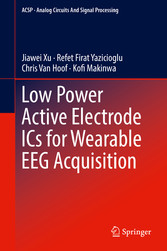Low Power Active Electrode ICs for Wearable EEG Acquisition
von: Jiawei Xu, Refet Firat Yazicioglu, Chris Van Hoof, Kofi Makinwa
Springer-Verlag, 2018
ISBN: 9783319748634
, 125 Seiten
Format: PDF
Kopierschutz: Wasserzeichen
Preis: 93,08 EUR
eBook anfordern 
Mehr zum Inhalt

Low Power Active Electrode ICs for Wearable EEG Acquisition
This book presents fundamental requirements, electrical specification, and parameter tradeoffs of wearable EEG acquisition circuits, especially those compatible with dry electrodes for user-friendly recordings. The authors introduce active electrode, the most promising solution for dry electrodes-based EEG measurement. This architectural concept has been combined with various, innovative circuit design techniques to illustrate structured IC design methodologies for high performance EEG recording. This book also gives examples on the design, implementation and evaluation of three generations of active electrode ICs.
Jiawei Xu received his M.Sc and Ph.D degrees in 2006 and 2016, both from Delft University of Technology, the Netherlands. From 2006, he has been working at Holst Centre/imec on low power sensor interfaces and wearable biomedical ICs. He is currently a senior researcher, leading the R&D on brain monitoring circuits and systems for wearable healthcare. He has developed biomedical signal acquisition ICs for EEG, ECG, bio-impedance, galvanic skin response (GSR) and near-infrared spectroscopy (NIRS). Dr. Xu was the recipient of the IEEE Solid-State Circuits Society (SSCS) Predoctoral Achievement Award (2014) and the imec Scientific Excellence Award (2014).
Refet Firat Yazicioglu is the head of Neuromodulation Devices at Galvani Bioelectronics R&D and responsible for the development of implantable devices and creation of new technologies for implantable devices. He received his PhD degree from KU Leuven in Belgium and worked 13 years at imec, Europe's largest independent research centre in microelectronics and nanoelectronics. He has developed wearable and implantable medical devices, including wireless cardiac monitoring patches, wearable EEG monitoring headsets and implantable neural probes for high density recording. Dr. Yazicioglu has served in the technical program committees of the European Solid State Circuits Conference (ESSCIRC), the International Solid State Circuits Conference (ISSCC), and the Biomedical Circuits and Systems Conference (BioCAS). He is Associate Editor for IEEE Transactions on Biomedical Circuits and Systems.
Chris Van Hoof received a PhD in Electrical Engineering from the University of Leuven in collaboration with imec in 1992. At imec, he became successively head of the detector systems group (in 1998), director of the microsystems department (in 2002) and Integrated Systems Department (in 2004), and program director (in 2007). Since 2009 he is department director and program director of HUMAN++ in the smart systems unit at imec in Leuven and the HOLST Centre in Eindhoven. Integrated microsystems research focuses on the application of advanced technology for the creation of miniature components and subsystems, ultra-low power wearable wireless sensor systems, and smart implantable devices. Since 2000 Chris Van Hoof is also a guest professor at the University of Leuven.
Kofi Makinwa holds degrees from Obafemi Awolowo University, Ile-Ife (B.Sc., M.Sc.), Philips International Institute, Eindhoven (M.E.E.), and Delft University of Technology, Delft (Ph.D.). From 1989 to 1999, he was a research scientist at Philips Research Laboratories, where he designed sensor systems for interactive displays, and analog front-ends for optical and magnetic recording systems. In 1999 he joined Delft University of Technology, where he is currently an Antoni van Leeuwenhoek Professor of the Faculty of Electrical Engineering, Mathematics and Computer Engineering and Chair of the Electronic Instrumentation Laboratory. Dr. Makinwa holds 18 patents, and has authored or co-authored 4 books and over 170 technical papers. He is on the program committee of the European Solid-State Circuits Conference (ESSCIRC) and the workshop on Advances in Analog Circuit Design (AACD). He has also served on the program committees of the International Solid-State Circuits Conference (ISSCC), the International Conference on Solid-State Sensors, Actuators and Microsystems (Transducers) and the IEEE Sensors Conference. He was a distinguished lecturer of the IEEE Solid-State Circuits Society (2008 to 2011) and a guest editor of the Journal of Solid-State Circuits (JSSC). He has given invited talks and tutorials at several international conferences including ISSCC, ESSCIRC, ASSCC and the VLSI symposium. At the 60th anniversary of ISSCC, he was recognized as one of its top ten contributing authors. For his Ph.D. research, Dr. Makinwa was awarded the title of 'Simon Stevin Gezel' by the Dutch Technology Foundation (STW). In 2005, he received a VENI grant from the Dutch Scientific Foundation (NWO). He is a co-recipient of several best paper awards: from the JSSC (2), ISSCC (4), ESSCIRC (2) and Transducers (1). He is an IEEE Fellow, an alumnus of the Young Academy of the Royal Netherlands Academy of Arts and Sciences (KNAW) and an elected member of the AdCom of the IEEE Solid-State Circuits Society.









